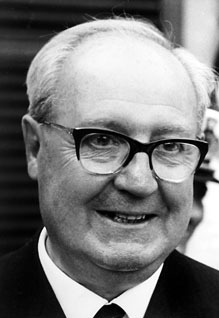Giuseppe Saragat
Giuseppe Saragat | |
|---|---|
 | |
| 5th President of Italy | |
| In office 29 December 1964 – 29 December 1971 | |
| Prime Minister | Aldo Moro Giovanni Leone Mariano Rumor Emilio Colombo |
| Preceded by | Antonio Segni |
| Succeeded by | Giovanni Leone |
| Minister of Foreign Affairs | |
| In office 4 December 1963 – 22 July 1964 | |
| Prime Minister | Aldo Moro |
| Preceded by | Attilio Piccioni |
| Succeeded by | Aldo Moro |
| Deputy Prime Minister of Italy | |
| In office 10 February 1954 – 19 May 1957 | |
| Prime Minister | Mario Scelba Antonio Segni |
| Preceded by | Attilio Piccioni |
| Succeeded by | Giuseppe Pella |
| In office 1 June 1947 – 27 January 1950 | |
| Prime Minister | Alcide De Gasperi |
| Preceded by | Position established |
| Succeeded by | Attilio Piccioni |
| President of the Constituent Assembly | |
| In office 25 June 1946 – 6 February 1947 | |
| Preceded by | Carlo Sforza |
| Succeeded by | Umberto Terracini |
| Personal details | |
| Born | 19 September 1898 Turin, Piedmont, Kingdom of Italy |
| Died | 11 June 1988 (aged 89) Rome, Lazio, Italy |
| Political party | Unitary Socialist Party (1922–1930) Italian Socialist Party (1930–1947) Italian Democratic Socialist Party (1947–1988) |
| Spouse | Giuseppina Bollani (died 14 January 1961)[1] |
| Alma mater | University of Turin |
Giuseppe Saragat (Italian pronunciation: [dʒuˈzɛppe ˈsaːraɡat][a]; 19 September 1898, Turin – 11 June 1988, Rome)[2] was an Italian politician who was the fifth President of Italy from 1964 to 1971.
Early life
Born to Sardinian parents, he was of the Unitary Socialist Party from 1922. He moved to Vienna in 1926 and to France in 1929.
Political career
Saragat joined the Italian Socialist Party in 1930. He was a reformist democratic socialist who split from the Italian Socialist Party in 1947 out of concern over its then-close alliance with the Italian Communist Party. He founded the Socialist Party of Italian Workers, which would soon become the Italian Democratic Socialist Party. He would be the latter's paramount leader for the rest of his life.[3]
He had been minister without portfolio for the Italian Socialist Party of Proletarian Unity in 1944 and ambassador in Paris from 1945 to 1946, Saragat was appointed President of the Constituent Assembly of Italy. He was then Minister of Foreign Affairs from 1963 to 1964, when he was chosen President of the Italian Republic. His election was the result of one of the rare instances of unity in the Italian left and followed rumours of a possible neo-fascist coup during Antonio Segni's presidency.[3][4]
He is said to have been an atheist,[5] but after that he became a catholic and he had religious funeral.[6]
Notes
- ^ The correct pronunciation is /saraˈɡat/, but /ˈsaːraɡat/ has always been more common.
References
- ^ Vespa, Bruno (7 October 2010). "L'amore e il potere". Edizioni Mondadori. Retrieved 14 August 2018 – via Google Books.
- ^ Rizzo, Tito Lucrezio (23 October 2012). "Parla il Capo dello Stato: sessanta anni di vita repubblicana attraverso il Quirinale 1946-2006". Gangemi Editore spa. Retrieved 14 August 2018 – via Google Books.
- ^ a b Saragat, Giuseppe: “Dizionario di Storia” – Treccani (in Italian) Retrieved 20 April 2013.
- ^ Hevesi, Dennis. "Giuseppe Saragat Is Dead at 89; President of Italy From '64 to '71". Retrieved 14 August 2018.
- ^ Bruno Vespa, L'amore e il potere. da Rachele a Veronica, un secolo di storia italiana, Mondadori, Milano, 2009, p. 120.
- ^ From Padre Rotondi e la "conversione" di Saragat
External links
- Newspaper clippings about Giuseppe Saragat in the 20th Century Press Archives of the ZBW
 Media related to Giuseppe Saragat at Wikimedia Commons
Media related to Giuseppe Saragat at Wikimedia Commons
- 1898 births
- 1988 deaths
- People from Turin
- Italian atheists
- Italian resistance members
- Italian Socialist Party politicians
- Presidents of Italy
- Deputy Prime Ministers of Italy
- Foreign ministers of Italy
- Italian Life Senators
- Italian socialists
- Italian anti-fascists
- Italian Democratic Socialist Party politicians
- 20th-century Italian politicians
- University of Turin alumni
- Politicians of Piedmont
- Politicians of Sardinia
- Italian prisoners and detainees
- Italian expatriates in France
- Italian expatriates in Austria
- Members of the Executive of the Labour and Socialist International
- Ambassadors of Italy to France
- Unitary Socialist Party (Italy, 1922) politicians
- Italian exiles



